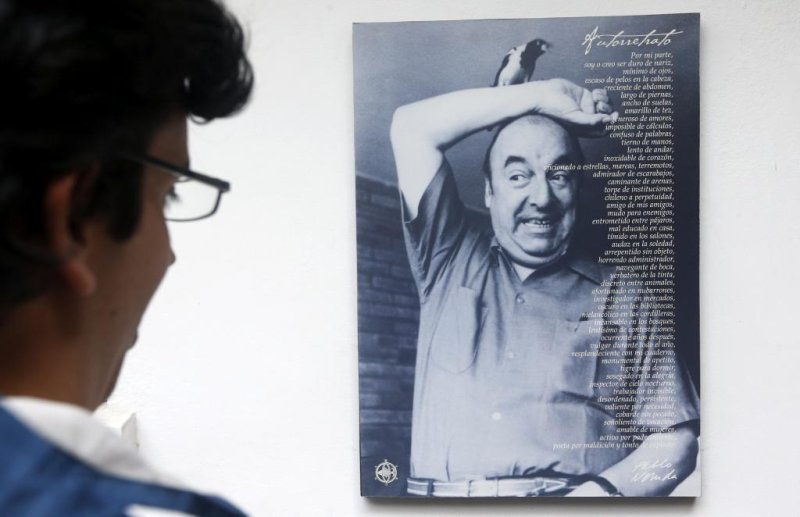A visitor looks at a photo of Chilean poet Pablo Neruda in Santiago, Chile, in 2013. Last week, an international team of forensic experts concluded Neruda, who died on September 23, 1973, did not die of prostate cancer. File Photo by Felipe Trueba/EPA-EFE
Oct. 22 (UPI) -- An international panel of forensic experts has determined that Chilean Nobel Laureate Pablo Neruda did not die of cancer in 1973 as official accounts concluded, and that new evidence gives credibility to longstanding rumors that he was poisoned.
Neruda, one of Chile's most famous poets and a close friend of then-socialist president Salvador Allende, died two weeks after Allende was killed during a U.S.-backed military coup. The official cause of death was cancer cachexia, but there had always been rumors that Neruda's death was caused by more nefarious means.
Those whispers gained greater volume last week when an expert panel analyzed some remains of Neruda and determined cancer cachexia couldn't have been the cause of death.
"That cannot be correct," said Dr. Niels Morling, a forensics expert form the University of Copenhagen who participated in the analysis. "There was no indication of cachexia. He was an obese man at the time of death. All other circumstances in his last phase of life pointed to some kind of infection."
The experts said they found evidence of a deadly bacteria in one of Neruda's molars, but whether that was from poisoning or a natural result of a decomposing body remains to be determined.
"We can't confirm how the bacteria got there," said Debi Poinar, an anthropology research assistant at McMaster University in Ontario, Canada. "We have to be very careful because there are a lot of bacteria that have their origin in the soil and some of those bacteria are the most pathogenic. We have some indications that it's an old bacteria, not a modern or laboratory contaminant."
The effort to re-examine the cause of Neruda's death began in 2011 when witnesses, including his former personal driver, Manuel Araya, began speaking out about the possibility that Neruda was murdered.
Araya said on the day Neruda died, the poet called him from the hospital to alert him that somebody in the hospital injected a substance into his stomach.
"Until the day I die, I will not alter my story," Araya told BBC News in 2013. "Neruda was murdered. They didn't want Neruda to leave the country so they killed him."
A document from Chile's Interior Ministry about Neruda's death, dated March 25, 2015, said he was "injected with a pain killer that produced the cardiac arrest that would cause his death."















